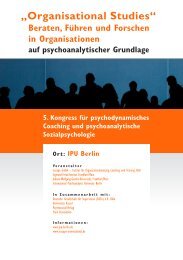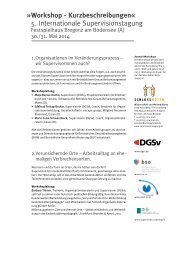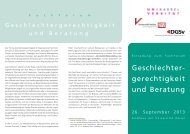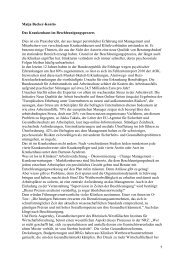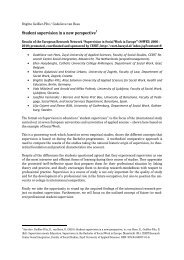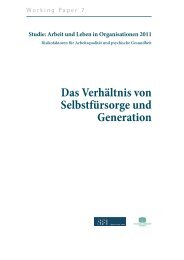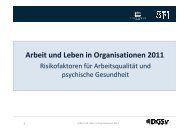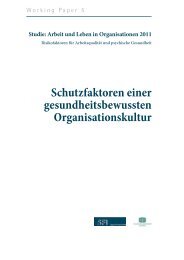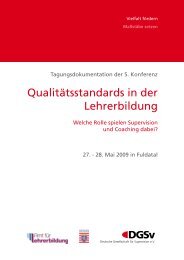Internationale Institutionen und nichtstaatliche Akteure
Internationale Institutionen und nichtstaatliche Akteure
Internationale Institutionen und nichtstaatliche Akteure
Erfolgreiche ePaper selbst erstellen
Machen Sie aus Ihren PDF Publikationen ein blätterbares Flipbook mit unserer einzigartigen Google optimierten e-Paper Software.
ence in Beijing (both of 1995). Of particular<br />
relevance for the ethics of global governance<br />
is the Millennium Declaration of 2000 which<br />
sets high standards for universal peace, prosperity<br />
and sustainability.<br />
Mallavarapu: The UN is <strong>und</strong>oubtedly<br />
the international body which enjoys the widest<br />
legitimacy globally. However, in my opinion<br />
it is essential in the interest of legitimacy<br />
that we get back to regional or local sources<br />
to find global values. In India, Mahatma Gandhi<br />
and Rabindranath Tagore, a popular Bengali<br />
poet, novelist and musician, are excellent<br />
exemplars of locally anchored cosmopolitan<br />
beings. Why always refer only to [Imma nuel]<br />
Kant when we think of cosmopolitanism?<br />
Sure, he had some very important ideas to offer<br />
the world but we need to also take into<br />
consideration sophisticated thinking in other<br />
parts of the world. In my view, regional references<br />
are essential in order to find a global<br />
consensus on values and norms. The archive<br />
must be opened up to include thinking available<br />
in both past and present in Africa, Latin<br />
America and Asia. This has to be done with<br />
genuine interest, rather than merely as token<br />
gestures of goodwill. To begin with we must<br />
all be better listeners. The rest follows only<br />
subsequently.<br />
Fues: I would agree that many examples<br />
from history can also be valuable sources for<br />
the constitution of global norms. I am thinking<br />
for example of the governing principles of<br />
the Indian Emperor Ashoka (304–232 BCE),<br />
who established a political system based on<br />
ethical commitments in regard to equality of<br />
all human beings, respect of religions, nonviolence,<br />
prohibition of slavery and the death<br />
penalty, environmental protection and animal<br />
welfare. His kingdom is also seen as the<br />
first to provide humanitarian assistance to<br />
neighbouring countries, including medical<br />
personnel, facilities, medicine as well as engineers.<br />
Another interesting example is the<br />
Tang dynasty in China (618–907 CE), with its<br />
cosmopolitan achievements such as peaceful<br />
coexistence of ethnic communities, religious<br />
and cultural freedom, equality of women<br />
and, to a limited extent, rule of law. In my<br />
<strong>und</strong>erstanding, any global ethical framework<br />
derived from historical experiences, religious<br />
teachings and cultural values would<br />
have to be deliberated and negotiated in an<br />
inclusive, transparent fashion, preferably un-<br />
der the aegis of the United Nations. For this<br />
purpose, I could imagine both a decision of<br />
the UN General Assembly by consensus or a<br />
majority decision which allows for a limited<br />
number of dissenting votes.<br />
“Nobody forces a government<br />
to ratify a human rights agreement”<br />
And where do you see the main challenges to<br />
these universal projects?<br />
Fues: We have to acknowledge that the impact<br />
of normative frameworks such as that of<br />
the UN is weak since member states ignore<br />
them at their will with impunity. There are<br />
huge gaps in monitoring and no sanctioning<br />
mechanisms – except in international security<br />
and trade. These gaps structurally privilege<br />
the arbitrary exercise of sovereign rights<br />
– the pursuit of narrow national self-interest –<br />
over the ethically based concept of “enlightened<br />
sovereignty” (Stephen Harper) which<br />
puts equal emphasis on global responsibilities<br />
and multilateral cooperation. Another<br />
challenge to UN norm-creation comes <strong>und</strong>er<br />
the guise of anti-colonial emancipation. It is<br />
claimed by some quarters that ethic al standards<br />
in general and the particular hierarchy<br />
of moral priorities have been created to serve<br />
the interests of western states. This position<br />
disregards the broad participation of political<br />
leaders and scholars from the developing<br />
world. Still, in a historical perspective, the<br />
contested documents originate from a period<br />
of western predominance. It may therefore be<br />
advisable to initiate a new process for global<br />
ethics which reflects multipolarity and explicitly<br />
draws on value systems and historical<br />
experiences from the South.<br />
Mallavarapu: This is not only a question<br />
of historical perspective. One of the big challenges<br />
is the contradiction between the principle<br />
of equal legal standing between all UN<br />
member states, and the stark differentials<br />
in the world system in terms of actual state<br />
standing. The UN is probably the most attractive<br />
forum to jointly discuss global values.<br />
But even within the UN system, the Security<br />
Council is an exclusive club. The UN<br />
General Assembly, which is far more representative<br />
than the Security Council, is not<br />
half as influential. The structures of the UN<br />
are in high need of reform. Outside the UN<br />
APuZ 34–35/2010 11




